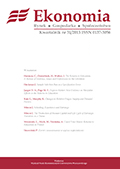Issue number: 25
In this issue:
Agglomeration and Institutional Effects on Dynamics in Regional Disparities: Experience from Poland and Japan
R. Nakamura, M. Taguchi
ABSTRACT |
PDF
Poland and Japan, there were quite different characteristics in terms of economic system. Since drastic change of economic system in Poland in 1989, increase of economic disparities in terms of unemployment rates across regions was remarkable, probably due to the spatially deviated foreign direct investment. However, in recent years we can also observe a tendency of divergence in regional economic disparities inNUTS 2 level. Turning to Japanese regions, inter-regional income disparities is expanding since 2001 while in 1990s Japanese economies were strongly suffered from the Bubble burst. Japanese central government is now thinking about the reformulation of regional (local) governments, called prefectures. At this point, it is worthwhile to examine dynamics in regional disparities of two countries by comparing quantitatively regional institutional systems as well as economic situations.With regard to convergence/ divergence model in the sense of Barro and Sala-i-Martin, there are few studies which incorporate agglomeration effects. We try to explain the dynamics of inter-regional disparities by institutional factors, which are different between two countries, as well as economic factors. The estimation model starts from defining regional production function, and we propose a new estimation model and implement estimation with regional time-series and cross-section data of Poland and Japan. Finally, we would like to refer to some policy implications for desirable regional economic system.
Chaos u podstaw ekonomii (o wieloznaczności terminów "ekonomia pozytywna" i "ekonomia normatywna")
B. Czarny
ABSTRACT |
PDF
In this article I want to show the ambiguity of the popular division of economics: “positive economics” and “normative economics”. In my opinion economists interpret the meaning of these terms in different ways. At the beginning I present the criteria of distinguishing “positive economics” from “normative economics”, which are often used by different groups of contemporary economists. Then I create a typology of different meanings of these terms used by the economists. Finally, I quote different economists who use these terms in different meanings. This way I present the ambiguities in economists’ language. I conclude by indicating the damage caused by the ambiguity of the discussed classification. It can be the cause of unsolved arguments that unnecessarily involve participants’ time and effort.
Badania budżetów gospodarstw domowych w Polsce
M. Pęczkowski
ABSTRACT |
PDF
Conducted by the Central Statistical Office (CSO) household budget survey (HBS) is a major source of revenue and expenditure, and consumption of durable goods equipment of Polish households. These data is also essential for many advanced statistical analysis and international comparisons. The article presents the objectives and scope of HBS with a brief review of history and methodology. Particular attention was paid to the contribution of other staff of the Faculty of Economic Sciences participating in international projects PACO and CHER using the panel data based on the annual collection of the CSO. Other studies conducted in Poland using the HBS data were mentioned as well. At the end an example of multivariate statistical analysis based on data from the HBS 2007 was presented. This is the study of the consumption expenditure of households using the correspondence analysis.
Banki centralne jako wiodące instytucje publiczne w dążeniu do poprawy efektywności funkcjonowania – część I
L. Chodorowski
ABSTRACT |
PDF
This article consists of 2 parts and describes the importance of improving the effectiveness and efficiency of central banks’ performance. Firstly, central banks are seen as important representatives of public institutions, and their effectiveness and efficiency are shown on the grounds of microeconomics. Secondly, the kinds of organizational structures, which are typical for central banks or which are possible to be used, are analyzed due to the effectiveness and efficiency.
In the first part of this 2-part article the author refers to the new institutional economics (NIE), the transaction costs theory, the agency theory and the signaling theory and indicates the connection between these theories and the functioning of central banks. The notions of strategy, organizational structure and business process have been briefly analyzed as well. Next, the definition and assessment criteria of effectiveness and efficiency for central banks are created. This definition highlights the fact that the effectiveness and efficiency of a central bank consists of the way of the organization of its integrity and of all the bank’s activities, which assure the achievement of established purposes (such as offered by the bank services) as well as that of a satisfying financial outcome (simultaneously the expenditures are not increased and the services quality is maintained).
Greed vs. Love of Science in Young Economists A Field Experiment
M. Krawczyk
ABSTRACT |
PDF
This paper reports a field experiment involving manipulation of invitations to register in an experimental economics subject database. Two types of invitations were sent, one emphasizing pecuniary and the other non-pecuniary benefits of participation. It was found that first-year economicsmajors weremuch more money-oriented, i.e. relatively more attracted by the first type of invitation, than any other group. This supports the view that the often-observed selfishness of economists results from selection and, if anything, is mitigated by training.
Modelowanie zamożności polskich gospodarstw domowych metodami statystycznymi
M. Jagielski, R. Kutner
ABSTRACT |
PDF
The aim of this work is to analyze the empirical cumulative layouts of annual household income in Poland between 2000 and 2006. Data were collected from the Central Statistical Office. The layouts were compared with predictions of Pareto rights, Law of Proportionate Effect, generalized Lotka-Volterra model and models of collisions. It turned out that middle class and wealthy Polish households are described very well by the cumulative distributions of Pareto, which differ by the value of the Pareto exponent. On the other hand the income of poor households is described by a cumulative log-normal distribution. To describe the poor andmiddle class households the generalized Lotka-Volterra model can be used, which provides the theoretical interpretation of the level of individual households.
Czy można przewidzieć krach?
S. Drożdż, J. Kwapień, P. Oświęcimka, R. Rak
ABSTRACT |
PDF
This article presents one of the most promising methods to predict the sudden changes in the stock market, namely the theory of log-periodic oscillations. The authors, in addition to the above theoretical basis method referring to the theory of complex systems and critical phenomena, show empirical evidence of the effectiveness of this approach in predicting both the bust in the stock market, as well as in the resources market. The examples (based on the analysis and forecasts) shown in the research confirm that self-similar log-periodicity with a parameter contraction lambda ~ 2 is able to properly describe the dynamics of the stock exchange on different time scales.What ismore, the prediction, indicating a reversal of the uptrend in the stock market in September and October in 2009, was shown.
Charakterystyki fluktuacji finansowych
S. Drożdż, P. Oświęcimka, R. Rak
ABSTRACT |
PDF
The study will examine the probability distributions of returns for the WIG20 index and the portfolio for the period from 17.11.2000 to 30.06.2005. These are the highest frequency (1 min) and the so-called tick by tick data (quotes at the time of the transaction). Except the data from the Polish stock market, the data from so-called mature markets (such as trading for the 1000 largest companies from the NYSE and NASDAQ index) will be analyzed. The analytical form of distributions (called q-Gaussian) will also be proposed. Nowadays it is one of the best representations describing the actual distributions.

